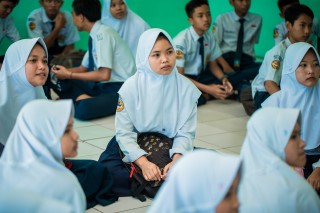Related
Also check out our other stories!
From our Yes I do programme
For young people in West Java, buying a condom is forbidden and the word “vagina” is simply too offensive to say out loud. But aided by “SETARA”, a manual on sexuality education, headmaster and sexuality education teacher Pak Yanto Suryahadi and his class of adolescents are navigating their way through the moral minefield of sexual taboos in Indonesia.

Yanto Suryahadi (46) proudly walks across the schoolyard of “his” lilac-hued school building in a village on the south-western coast of Java. The spirited vice principal, who seems to have a perpetual smile on his face, is dressed in a khaki uniform.
“When we started up a sexuality-education module, at the end of 2017, it didn’t take long before the disapproving murmurings of parents were audible in the schoolyard. Sex before marriage is referred to as zinā in Java and is seen as unclean in the eyes of Islam, which is why parents and schools completely avoid the subject,” explains Pak Yanto (“sir Yanto“), as the students call him. “Consequently, there is nowhere that children can turn to for reliable information. And with that kind of playing field we have no hope of stopping sexual abuse, teenage pregnancies and sexually transmitted diseases.”
Girls in school uniforms (long blue skirts, white blouses and white niqabs) move across the schoolyard towards the classrooms in a group. The break is almost over. “To accommodate the concerns of the parents, the school board decided to update them about the lessons every two weeks. And this has proved as beneficial as the proverbial killing of two birds with one stone, because now the parents are also learning to discuss desires and boundaries.”
The group of girls enters the classroom, but not before they all take off their shoes black All Star sneakers and leave them near the door. Together with a group of boys, the girls squat on the stone floor and the lesson begins. Today it’s lesson three: changes in the body. And soon the teacher is inundated with questions about bullying, gender and consent.

Indonesia boasts the dubious honour of having one of the highest number of child brides in the world. No fewer than 1.4 million Indonesian girls have found their way to the altar, often against their will. Child marriage is a serious violation of a girl’s rights and often has life-long consequences for the victim. She can forget about finishing school and without an education or income she will later become completely dependent on her husband and his family. Moreover, a young girl will often have to contend with domestic violence and have babies while her body is not really ready for pregnancy or childbirth. All this brings significant health risks.
“And what have you learned so far from SETARA,” the teacher asks the class. “That my body is my own and nobody else’s,” a 13-year-old girl at the back of the class whispers, her hand covering her mouth. The other girls nod silently in agreement. A boy at the front of the class raises a finger and seeks confirmation that a wet dream is not haram (forbidden). His question is accompanied by fleeting glances and sniggers. Meanwhile, a girl by the window says: “I don’t want to be married off; I have the right to finish my education!”

Pak Yanto is clearly enthusiastic about SETARA. “Since starting it up in 2017, the number of child marriages here has fallen significantly,” he says proudly. “It teaches every girl that her body does not belong to her parents, who sometimes beat her. Nor does it belong to a boy, who might want sex with her. She, and she alone, has the right to decide what happens to her body. With the on-going reduction of child marriages, girls are staying in school longer. In most areas of education they are even doing better than the boys. It’s indeed a minor revolution.”
“Giving sexuality education here feels just like walking a tightrope,” laughs Pak Yanto. “But it is far too important not to continue.” Given the choice, he would start these lessons at kindergarten age, so that talking about their bodies, desires and boundaries will be less of a taboo when the children get older. But it is still like navigating a minefield and he thus has to be careful. In the Indonesian island of Lombok they actually want to banish SETARA because it’s too offensive.
After the lesson the boys and girls put on their shoes again and walk out into the all-enveloping warmth. Next week, in lesson four they’ll be learning about healthy relationships. “It’s good to see the programme having the desired effect among my students,” says Pak Yanto, closing the classroom door behind him. “Children are being given control over their bodies, their desires and their future. And it’s about time too. Let’s face it, it’s no less than they are entitled to.”
Story by: Marlies Pilon
In 2017 the Yes I Do Alliance, working in conjunction with Indonesian organisations, started up the SETARA pilot project, a sexuality-education module for young people between the ages of 12 and 14. The Yes I Do Alliance is a collaboration between Plan International Nederland, Rutgers, Amref Flying Doctors, Choice for Youth and Sexuality, KIT Royal Tropical Institute and the Netherlands’ Ministry of Foreign Affairs. By, among other ways, educating youngsters about sexuality and their rights, the Alliance tackles issues underlying child marriages, female genital mutilation and teenage pregnancies. The five-year programme runs till the end of 2020 and is being implemented in Indonesia, Mozambique, Malawi, Zambia, Kenya and Ethiopia.
Also check out our other stories!
Uw browser (Internet Explorer 11) is verouderd en wordt niet meer ondersteund. Hierdoor werkt deze website mogelijk niet juist. Installeer Google Chrome of update uw browser voor meer internetveiligheid en een beter weergave.